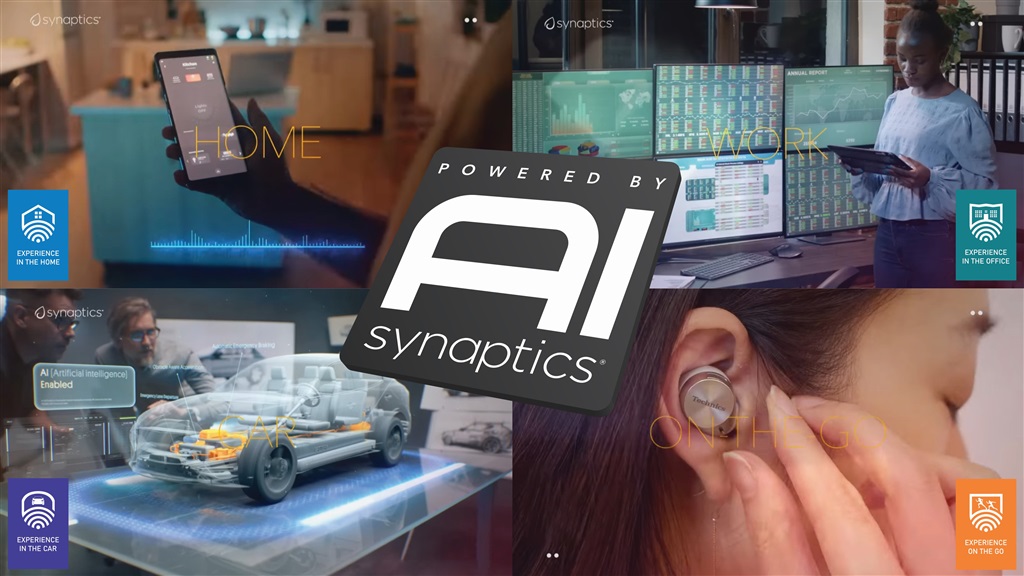As the leader in sensing, processing, and connectivity for the intelligent Internet of Things (IoT), Synaptics has infused artificial intelligence (AI) across a comprehensive suite of edge solutions to allow our customers to deliver intuitive, responsive, and secure user experiences. From touchpads and fingerprint biometrics to smart helmets and digital signage, many of these AI-infused solutions are on display in our Computex booth and meeting room, along with the latest advances in wired and wireless docking, connected monitors, simultaneous dual-band wireless, and advanced audio. As cutting-edge as these solutions may be, they are only the tip of a revolution in system and product design that accelerates the push toward the ideal of a truly symbiotic human-machine relationship.
That revolution has already begun to alter thinking around the fundamental architectures underpinning AI. For example, Synaptics has developed a suite of edge AI solutions, such as its VS640, VS680, Katana, and DBM10L processors and associated machine-learning (ML) algorithms, that provide private, secure AI-enhanced functionality with low latency. Applications range from smart TVs, PCs, and digital signage, while functions include detecting and tracking user presence to ultra-low-power voice, speech, and sound event detection. All solutions enable context-aware computing at the edge for seamless interactions and responses that run independently of the Cloud and ensure that no user's personally identifiable information (PII) is compromised.
This separation of AI edge processing from back-end servers in data centers—where AI inference models are trained and where AI processing happens at a massive scale—has been generally accepted as a clear delineation between what are essentially parallel ecosystems with a loosely coupled relationship. However, a new report by Tirias Research predicts a breaking of the data center and a tightening of that relationship. This comes in the wake of a tsunami of Generative AI (GenAI)-based applications, made famous by ChatGPT, that are pushing server processing requirements exponentially upwards.
In its report in Forbes, Tirias lays out the case for its startling "breaking of the data center" headline while also providing a possible solution: employ edge-based processing resources in the form of a load-sharing arrangement. How this would be done is yet to be articulated, but this tightening of the server-edge relationship does present an interesting challenge, particularly given the recent emergence of Meta LLM (large language model) that may allow ChatGPT-like language assistants to run locally on edge devices.
As architectures and approaches continue to evolve, Synaptics will continue to lead the industry in infusing the core elements of AI into current and future generations of processors, sensors, and connectivity solutions.
Experience the Synaptics Difference
To view the latest AI-enabled solutions for the IoT, visit Synaptics at Booth #J1409, or make an appointment to meet us in our private meeting room. You'll experience our Vega capacitive touch- and force-sensing technology with built-in haptics and AI-enabled accidental contact mitigation (AI-ACM); a smart helmet with ANC and ENC that can remove background noise for listeners on the other end; and Synaptics Resonate which turns display surfaces into an audio source, complete with haptic feedback.
Announced at CES 2023, Resonate won Embedded Computing Design's "Best in Show" Award at Embedded World in March. Designed for applications ranging from wearables and smartphones to tablets and notebooks, Resonate removes the need for micro-speakers and their associated portals. This approach saves on space, power, and cost while also making designs more dust- and moisture-resistant, features that make Resonate particularly attractive to designers of ruggedized embedded systems.
You'll also see how our VMM9430 and DL-7400 quad-display processors are pushing the docking station envelope, supporting up to four monitors at up to 4K@144Hz. Notably, the DL-7400 is OS agnostic, allowing a single docking station to be deployed throughout the home and enterprise while preserving any currently used display or laptop infrastructure—with daisy chaining capability for easy scaling.
Other experiences include a real-time simultaneous dual-band (RSDB) radio that allows interference-free streaming of content to multiple screens in the home or in a car. With automotive in-cabin requirements evolving rapidly to be more like a living room environment, Synaptics has also evolved our solutions to support our recently announced SmartBridge display processor with Wi-Fi and Bluetooth wireless connectivity, noise cancellation, and user presence detection (UPD) solutions for driver alertness monitoring.

Synaptics Accelerates AI Infusion for User Experiences as Architectures Evolve


